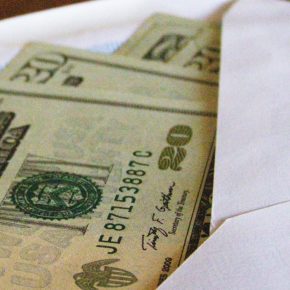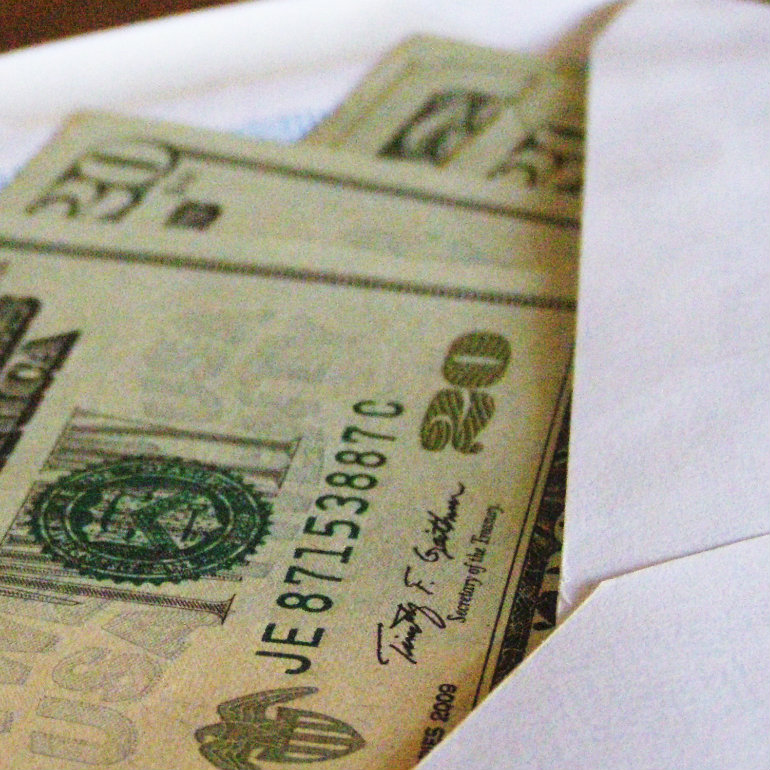Tydzień w gospodarce
Category: Trendy gospodarcze

(Chris Potter, CC BY)
On February the Lithuanian-born Economy Minister Aivaras Abromavičius, seen as one of the pillars of the contingent of pro-Western reformers in Ukraine, resigned.
“The reason for my decision is the sharp escalation in efforts to block systemic and important reforms in our country. This is no longer simply a lack of support and political will. It is an active effort aimed at paralyzing our reform efforts. Neither me, nor my team have any desire to serve as a cover-up for overt corruption, or to act as puppets for those who, much like the ‘old’ government, are trying to establish control over the flow of public funds. I don’t want to travel to Davos and talk about our successes to international investors and partners, while at the same time certain individuals are scheming to pursue their own interests behind my back. These people have names. I would like to name one today. The name is Igor Kononenko,” said Abromavičius, effectively accusing the business partner and closest colleague of President Petro Poroshenko of corruption.
As if that were not enough, the Deputy Head of the Prosecutor General’s Office of Ukraine Vitaliy Kasko, seen as enjoying broad support from the West, resigned in mid-February. He had enough of working in an organisation directly controlled by Poroshenko and seen as a major bastion of Ukrainian corruption (this was addressed, among others, by Geoffrey Pyatt, the American ambassador to Ukraine, during last year’s anti-corruption forum in Odessa). Kasko was a defence attorney in the trials of the participants of the Euromaidan protests, he is an expert of the Council of Europe, and at the prosecutor general’s office he was responsible for international cooperation and, consequently, for the search for assets derived from crime and concealed abroad.
“The Office of the Prosecutor General of Ukraine has become a brake on the reform of criminal justice, a hotbed of corruption, an instrument of political pressure, and one of the key obstacles to the arrival of foreign investment in Ukraine,” said Kasko. He further stated that the Prosecutor General’s Office, “creates and tolerates the total lawlessness of corrupt politicians and purchasable law enforcement employees and kleptocrats who have united their efforts and have become the nation’s main decision makers.”
According to Oleh Makhnitsky, a former prosecutor general, Kasko’s resignation concludes the removal of reform camp representatives from key positions in the prosecutor’s office and indicates a return to the status quo of the days of former president Viktor Yanukovych.
The West reacted swiftly to Abromavičius’s resgination. The ambassadors of Sweden, the U.S., the U.K., Canada, Germany, Italy, France, Lithuania and Switzerland issued a joint statement in which they called for Ukraine’s leaders to, “set aside their parochial differences, put the vested interests that have hindered the country’s progress for decades squarely in the past, and press forward on vital reforms.”
Commenting on Abromavičius’s resignation, Christine Lagarde, head of the International Monetary Fund, effectively threatened Ukraine with the suspension of macroeconomic assistance due to the pervasive corruption in the government.
“Abromavičius’s decision to resign from his post is of concern. If the allegations that he makes in his resignation are correct, then it’s obviously an indication that the anti-corruption measures that were committed to by the government are not yet working,” Lagarde said at a press conference in Washington. “The measures taken in the fight against corruption should be firm and tough, because the Ukrainian government has an obligation not only towards the Ukrainian people, but also towards the international community.”
According to Ukrainian sources, in a speech before the U.S. House of Representatives in late February, Secretary of State John Kerry said the insufficient results of Ukraine’s reforms were the reason for the International Monetary Fund’s suspension of the payment of the next tranche of macroeconomic assistance to Ukraine and the U.S. government’s delay in granting loan guarantees totaling USD1bn.
Jan Tombiński, the EU’s representative in Kiev, also left no doubt that the Poroshenko administration’s lacklustre reforms haven’t gone unnoticed by Ukraine’s Western donors. Tombiński harshly criticized Poroshenko’s team for blocking the launch of the National Agency for Prevention of Corruption (NAPC), which was supposed to become operational by the end of 2015.
“I cannot understand why the agency has not been established. It is a question of political will. There are no technical obstacles which would prevent this from happening. How to defeat corruption? It is a question of political will. The picture here is the same as with that agency: it cannot operate
The task of the NAPC is to verify the assets declarations of all persons holding public office.
In light of widespread criticism, the parliament ultimately adopted the Act on the Prevention of Corruption regulating the principles of operation of the NAPC, and the Ukrainian government issued a regulation establishing the agency. However, it will only exist on paper for quite some time. Justice Minister Pavlo Petrenko admitted that before it becomes operational it will be necessary to conduct a competition to select its members, but the selection committee has not yet been appointed. This means corrupt officials and politicians are safe for now.
Due to an amendment introduced by MP Vadym Denysenko of the Petro Poroshenko Bloc, the NAPC may well end up having nothing and no one to verify anyway. The amendment provides for the postponement of criminal liability for making false asset declarations until 2017. It also makes it much easier to hide the proceeds of corruption – only properties that have been acquired after the launch of the new system of asset declaration, and only financial liabilities of politicians and bureaucrats exceeding 150 times the minimum wage will be subject to declaration. The amount of individual expenditures subject to declaration has been increased from the equivalent of 20 to 100 minimum wages, and the amount kept in a bank account will only have to be disclosed if it exceeds 100 times the minimum wage (originally 50 times). A provision was also included that assets that are the source of income are not subject to declaration. As a result, for example, an official renting out his 10 apartments and earning income in this way will not have to include them in the declaration of assets.
Journalists from the investigative anti-corruption project Nashi Groshi were able to detect 54 MPs in the Ukrainian parliament who are unlawfully concealing assets. The largest number belong to the Petro Poroshenko Bloc (16 MPs), followed by former prime minister Arseniy Yatsenyuk’s People’s Front (9 MPs) and parties originating from the Party of Regions: the Opposition Block and People’s Will (6 MPs each). The remaining parliamentary factions each have a few MPs concealing assets.
Among the companies that Nashi Groshi reporters were able to identify, 18 are operating in the agricultural and food sector, 15 in the construction and real estate sectors, 11 in trade, 10 in legal services, and 6 six in advertising. MPs on the Nashi Groshi list are mostly small fry, however. That is because it does not include those who hide their assets abroad and in tax havens, and these are the favourite places where the top Ukrainian politicians locate their businesses.
Even once the agency gets rolling, it won’t have an easy time. In response to the Kononenko scandal, Poroshenko vetoed a law which allowed for the wiretapping of corruption suspects. That means illegal activity can only be proven if the corrupt individual admits to the crime or inadvertently reveals evidence of their unlawful actions.
In June, Poroshenko vetoed a different law, which gave citizens and non-governmental organizations the right to submit accusations of corruption to the court.
“The rights granted by the act carry a risk of violation of the constitution and the laws, deterioration of the situation regarding human rights and liberties, pose a threat to national security, and therefore cancel out any potential positive effect of its adoption,” he argued.
“In response to the corrupt ruling elite’s reluctance towards real change and the modernization of the country, the West is extending `elements of external control’ and this task is performed by the ambassadors of the G7 states,” said Bohdan Jaremenko, head of the Kiev-based think-tank Maidan of Foreign Affairs. He emphasizes that, contrary to the assurances of the authorities, the reforms in Ukraine haven’t even begun.
“In this situation, the West will impose tougher conditions for the implementation of assistance projects, financing and lending. Harsher controls will be established, instead of simple interest in whether something was done or not. Every step of the people who are involved in these tasks will be controlled. At the same time, the elements of external management will be extended. It has already started happening,” said Jaremenko.
According to him, the task of supervising the Ukrainian government, currently fulfilled by Western ambassadors, could in the near future be taken over by a more or less formalized structure created by the West.
“This is both good and bad. Good, because this pressure could force the Ukrainian authorities to start changing. Bad, because the interests of the West may not always coincide with the interests of Ukraine,” said Jaremenko.
Former deputy prime minister Oleh Rybachuk, who was responsible for Ukraine’s European integration in 2005, is equally pessimistic in his assessments of Ukrainian reforms and the chances for their real implementation. As he notes, on the one hand, Ukraine has no chance of defeating corruption in the near future, but on the other hand, the type of state currently functioning in Ukraine has no chance of surviving in the long run.
“Replacing the ministers will not change anything. The ousted oligarchs will be replaced by others. In Europe, after such a statement of a minister [as in the case of Abromavičius’s resignation] we would see a number of resignations and a big political scandal. However, I can’t see any attempt on the part of the president, not to mention the government, to change this system. I don’t see a threat to the corrupted management system which has existed in Ukraine for more than 20 years,” Rybachuk said in an interview with the Ukrainian news service Obozriewatiel.

